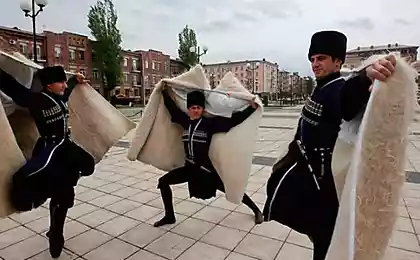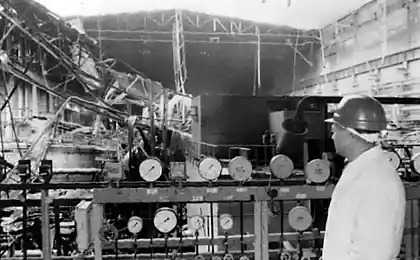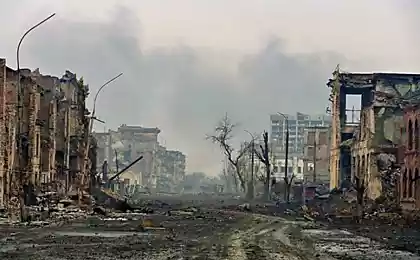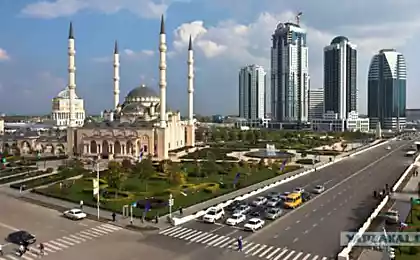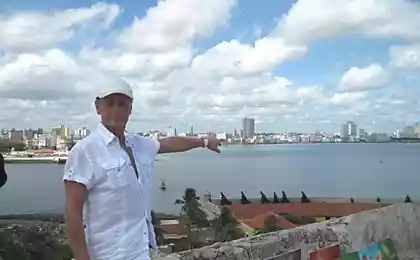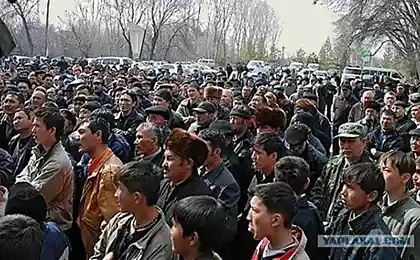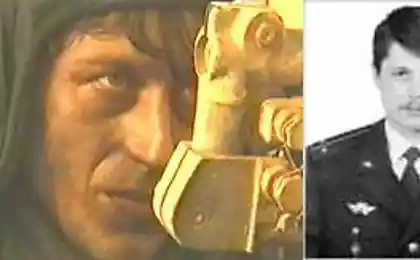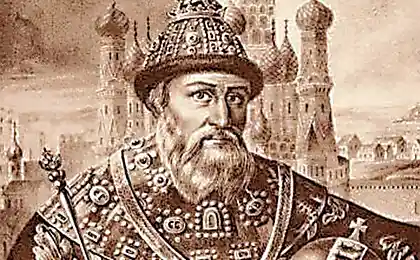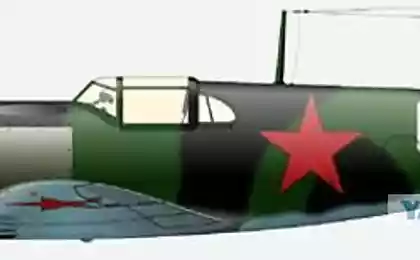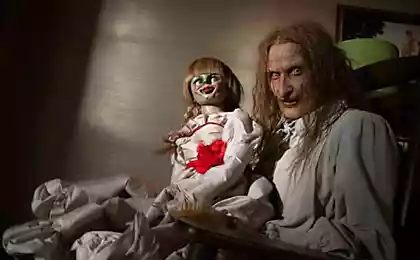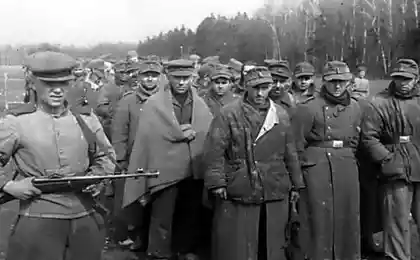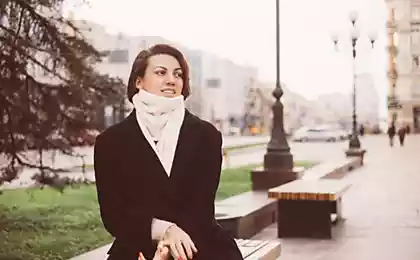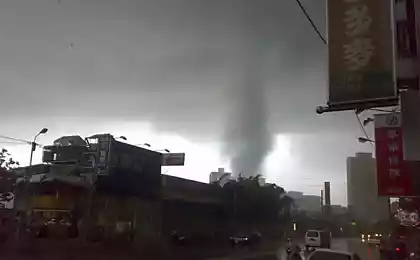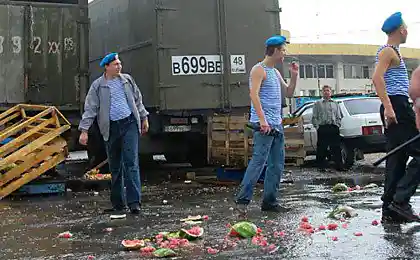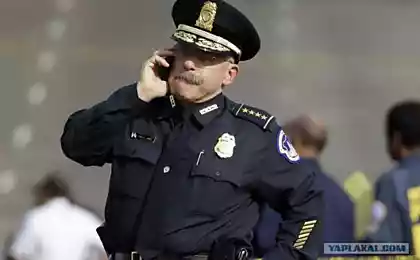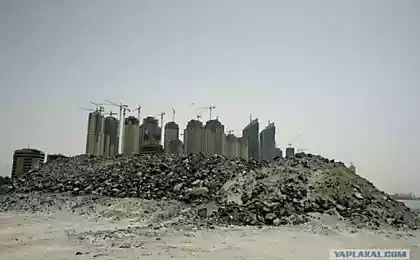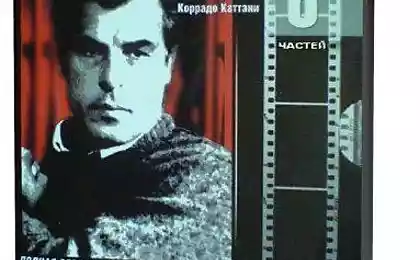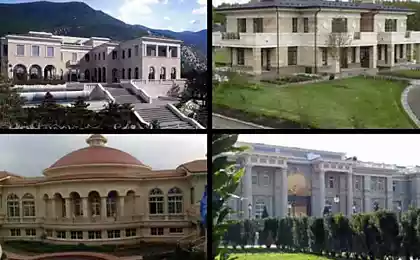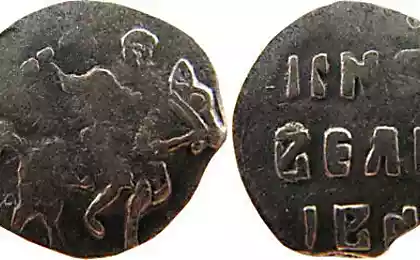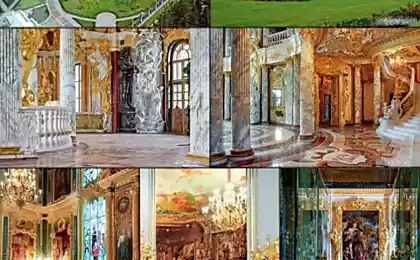873
Chechen pogrom in Soviet Grozny
Many Russian familiar with the history of the Soviet Union only in snatches from the curriculum and nostalgic transmissions on the "First" can assume that the ethnic conflicts that are so abundant in the year gone - this is what could not be in a friendly, internationalist Soviet Union. Today I'll tell you about one example of a Soviet friendship of the Russian people and the people-academician.
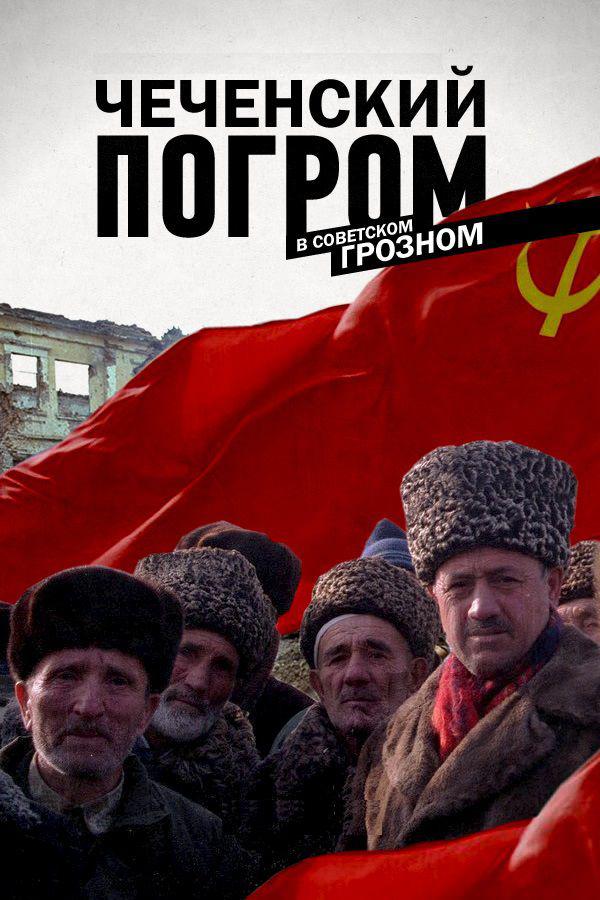
July 16, 1956 issued a decree of the Supreme Soviet of the USSR "On the lifting of restrictions on special settlements with Chechens, Ingush, Karachai and their families." The poor, unfortunate mountaineers, which for some reason povyselyali in Kazakhstan, was allowed to leave his place of exile.
The relocation of the Chechens, Ingush and other small nations happened more massive than could be assumed the Soviet regime, and the process began to go out of control. We had difficulty finding employment, housing and socialization, which gradually began to develop into a problem with illegal possession of weapons, murder and attacks on residents of the Chechen-Ingush Autonomous Soviet Socialist Republic of non-indigenous nationalities. Chechens began to intimidate the local anti-Russian in Grozny distributed leaflets have been recorded attacks on Chechen youth students of vocational schools and officers of the Soviet Army. As a result, during 1957 beyond the CHI ASSR left 113,000 Russian, Ossetians, Avars, Ukrainians and citizens of other nationalities (the results of the population census in 1959 showed that the country is home to only 710,424 people). Among those who chose to stay were strengthened anti-Chechen sentiment. Needed was a spark, which broke out August 23, 1958.
On the evening of the day in the suburbs of Grozny, the Chechen Lulu Malsagov, while drunk, he started a brawl with the Russian guy Vladimir Korotchevym and inflicted knife wounds to the stomach (he was able to save). On the same day Mal'sagov had another conflict with the workers of a chemical plant, one of which - Eugene Stepashin - received several stab wounds, which became fatal for him.
Rumors about the murder of Chechen Russian Man spread quickly among plant workers and residents of Grozny. The reaction of the population was violent, despite the fact that the murderer rather quickly detained. Further fueled the leadership of the republic, forbidden to hold a memorial service at the site of a chemical plant where he worked Eugene, and hinder the spread of any information about what was happening.
August 26, 14 hours just want to Eugene, raising his hands on the coffin of the deceased, went to the center of Grozny. The protesters had intended to hold a rally on the square in front of the regional committee, which would declare their demands public execution of those arrested and out of parasitic elements from among Chechens living in Chernorechie. Along the way, the procession this mass grew by bystanders (according to various sources, had accumulated between 800 and 3,000 people). From the memoirs of Sergei Savich Belchenko, at the time, Colonel-General of State Security, arrived in Grozny to control what is happening:
"Some mourners were outraged and shouted," Why are not allowed to carry the coffin where you want to? "Finally, a group of women, about 50 people ran forward, ahead of going with wreaths, broke through a cordon of police and shouting turned the crowd on the street leading to the center . Then a crowd of women (up to 300 people) went ahead and did not allow the police to block the approaches to the city center. Near the food market of one of the women began to call the people to the rally ».
By 17:00 the funeral procession went to the building of the regional committee, and, despite the ban, began mourning rally. To even out the protesters regional party secretaries GY Cherkevich and BF Saiko, but instead of talking about the problems that concern the people they asked the indignant Russian "stop the hooligans".
Meanwhile, some of the protesters attempted to enter the building of the regional committee, and 19 hours 30 minutes they succeeded. A group of youths broke into the regional committee and tried to get the power to the area chairman of the Council of Ministers of the Autonomous Republic CHI Gayerbekova, second secretary of the Party Committee Chahkieva and other employees. With great difficulty, KGB and Interior Ministry succeeded to expel from the regional committee had broken through to the demonstrators and arrest the most active of them.
The protesters attacked the military and police vehicles and shift them with the soldiers on the streets adjacent to the square. They were stopped and beaten by two Chechens, passing by on a motorcycle. The Regional Committee of the windows were flying stones.
Toward two o'clock in the morning began to disperse the protesters and the police turned out to clean up the building of the regional committee, the day he was arrested 41 people.
The next day, on August 27 there was a new rally. From seven in the morning in the same area started gathering discontented citizens, discussing the events of yesterday and expressed dissatisfaction with the detention.
By noon on the square again gathered a crowd of thousands. Speakers insistently repeated their demands: release of the arrested and exiled Chechens from Grozny. Around one o'clock a large group of protesters once again stormed the regional committee and the pogrom - broken furniture, smashed windows, threw out into the street, and other paper documents. Another group managed to break into the building of the KGB and cause some property damage: windows were broken, break the door, etc. Breakthrough Cheka was quickly eliminated, and without the use of weapons. Also, the protesters stormed the Interior Ministry CHIASSR - looking detained a day earlier.
On the streets of some groups of rioters stopped cars - looking for Chechens. As later reported by Colonel-General SN Perevёrtkin "management team and a significant portion of employees MIA and district police departments removed uniforms for fear of a possible beating of hooligans».
Later in the afternoon, protesters wrote lyrics' meeting resolution, "where, among other things, the requirements of" Chechen-Ingush population allowed to live in the Grozny area of no more than 10% of the total population "and" deprived of all the benefits of the Chechen-Ingush population in comparison with other nationality. " The rebels tried to storm the Russian radio station and telephone exchange to convey their demands to Moscow (both were unsuccessful assault, during the storming of the telephone exchange, one person was killed and two were injured). It was possible it is only with the post office by storm. At 23 o'clock a group of demonstrators went to the station and blocked the railway. People broke into cars and asked to convey to the other cities of what was happening. The cars appeared the inscription "Brothers! Chechens and Ingush kill Russian. The local authority supports them. The soldiers fired at Russian! »
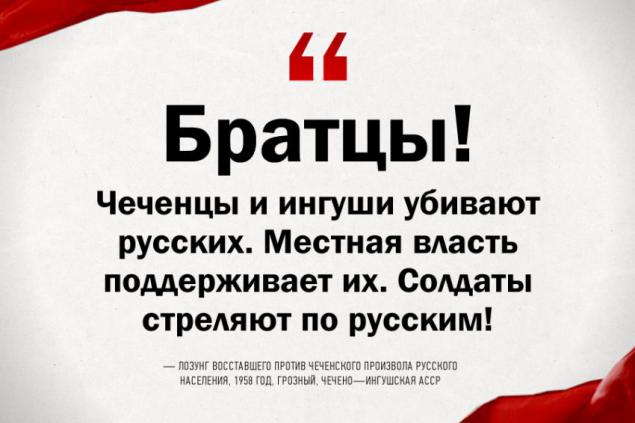
Around midnight the Terrible troops were brought. The crowd tried to resist, but the troops quickly crushed the resistance and the railway was unlocked. Simultaneously, the troops managed to restore order at the building of the regional committee. On the night of 27 on August 28 in Grozny was a curfew in force for four days.
The Soviet leadership, in spite of the wide resonance of what is happening, chose not to understand the causes of what is happening and to punish the most ardent activists - as a result of the investigation of current events, many participants were criminal terms (author of "The draft resolution," for example, received 10 years). Here is what he wrote on this occasion the doctor of historical sciences Vladimir Kozlov:
"Moscow party leaders have not been able to give a serious political assessment of events that clearly went beyond the casual scene - in the center of the city stormed a relatively small crowd of 10 thousand people. It was limited to a purely police measures and the usual ideological talking shop. No wonder that, despite all the efforts of the authorities, ethnic tensions as in Grozny, and remained in the country ... »
Total: Russian Empire - Caucasian war, mass deportation to Turkey, the constant skirmishes between local residents and mountaineers, punitive expeditions Whites. The Soviet Union - a mass eviction in Kazakhstan, the constant clashes between local residents and mountaineers, natural pogroms with the introduction of troops. Russian Federation - two wars, constant clashes between local residents and mountaineers, the pogroms in central Russia.
Do you still believe that the problem of the Caucasus in some unknown "assholes and provocateurs" who "rock the boat"? ALL 150 years ?!
--img3--
Source:

July 16, 1956 issued a decree of the Supreme Soviet of the USSR "On the lifting of restrictions on special settlements with Chechens, Ingush, Karachai and their families." The poor, unfortunate mountaineers, which for some reason povyselyali in Kazakhstan, was allowed to leave his place of exile.
The relocation of the Chechens, Ingush and other small nations happened more massive than could be assumed the Soviet regime, and the process began to go out of control. We had difficulty finding employment, housing and socialization, which gradually began to develop into a problem with illegal possession of weapons, murder and attacks on residents of the Chechen-Ingush Autonomous Soviet Socialist Republic of non-indigenous nationalities. Chechens began to intimidate the local anti-Russian in Grozny distributed leaflets have been recorded attacks on Chechen youth students of vocational schools and officers of the Soviet Army. As a result, during 1957 beyond the CHI ASSR left 113,000 Russian, Ossetians, Avars, Ukrainians and citizens of other nationalities (the results of the population census in 1959 showed that the country is home to only 710,424 people). Among those who chose to stay were strengthened anti-Chechen sentiment. Needed was a spark, which broke out August 23, 1958.
On the evening of the day in the suburbs of Grozny, the Chechen Lulu Malsagov, while drunk, he started a brawl with the Russian guy Vladimir Korotchevym and inflicted knife wounds to the stomach (he was able to save). On the same day Mal'sagov had another conflict with the workers of a chemical plant, one of which - Eugene Stepashin - received several stab wounds, which became fatal for him.
Rumors about the murder of Chechen Russian Man spread quickly among plant workers and residents of Grozny. The reaction of the population was violent, despite the fact that the murderer rather quickly detained. Further fueled the leadership of the republic, forbidden to hold a memorial service at the site of a chemical plant where he worked Eugene, and hinder the spread of any information about what was happening.
August 26, 14 hours just want to Eugene, raising his hands on the coffin of the deceased, went to the center of Grozny. The protesters had intended to hold a rally on the square in front of the regional committee, which would declare their demands public execution of those arrested and out of parasitic elements from among Chechens living in Chernorechie. Along the way, the procession this mass grew by bystanders (according to various sources, had accumulated between 800 and 3,000 people). From the memoirs of Sergei Savich Belchenko, at the time, Colonel-General of State Security, arrived in Grozny to control what is happening:
"Some mourners were outraged and shouted," Why are not allowed to carry the coffin where you want to? "Finally, a group of women, about 50 people ran forward, ahead of going with wreaths, broke through a cordon of police and shouting turned the crowd on the street leading to the center . Then a crowd of women (up to 300 people) went ahead and did not allow the police to block the approaches to the city center. Near the food market of one of the women began to call the people to the rally ».
By 17:00 the funeral procession went to the building of the regional committee, and, despite the ban, began mourning rally. To even out the protesters regional party secretaries GY Cherkevich and BF Saiko, but instead of talking about the problems that concern the people they asked the indignant Russian "stop the hooligans".
Meanwhile, some of the protesters attempted to enter the building of the regional committee, and 19 hours 30 minutes they succeeded. A group of youths broke into the regional committee and tried to get the power to the area chairman of the Council of Ministers of the Autonomous Republic CHI Gayerbekova, second secretary of the Party Committee Chahkieva and other employees. With great difficulty, KGB and Interior Ministry succeeded to expel from the regional committee had broken through to the demonstrators and arrest the most active of them.
The protesters attacked the military and police vehicles and shift them with the soldiers on the streets adjacent to the square. They were stopped and beaten by two Chechens, passing by on a motorcycle. The Regional Committee of the windows were flying stones.
Toward two o'clock in the morning began to disperse the protesters and the police turned out to clean up the building of the regional committee, the day he was arrested 41 people.
The next day, on August 27 there was a new rally. From seven in the morning in the same area started gathering discontented citizens, discussing the events of yesterday and expressed dissatisfaction with the detention.
By noon on the square again gathered a crowd of thousands. Speakers insistently repeated their demands: release of the arrested and exiled Chechens from Grozny. Around one o'clock a large group of protesters once again stormed the regional committee and the pogrom - broken furniture, smashed windows, threw out into the street, and other paper documents. Another group managed to break into the building of the KGB and cause some property damage: windows were broken, break the door, etc. Breakthrough Cheka was quickly eliminated, and without the use of weapons. Also, the protesters stormed the Interior Ministry CHIASSR - looking detained a day earlier.
On the streets of some groups of rioters stopped cars - looking for Chechens. As later reported by Colonel-General SN Perevёrtkin "management team and a significant portion of employees MIA and district police departments removed uniforms for fear of a possible beating of hooligans».
Later in the afternoon, protesters wrote lyrics' meeting resolution, "where, among other things, the requirements of" Chechen-Ingush population allowed to live in the Grozny area of no more than 10% of the total population "and" deprived of all the benefits of the Chechen-Ingush population in comparison with other nationality. " The rebels tried to storm the Russian radio station and telephone exchange to convey their demands to Moscow (both were unsuccessful assault, during the storming of the telephone exchange, one person was killed and two were injured). It was possible it is only with the post office by storm. At 23 o'clock a group of demonstrators went to the station and blocked the railway. People broke into cars and asked to convey to the other cities of what was happening. The cars appeared the inscription "Brothers! Chechens and Ingush kill Russian. The local authority supports them. The soldiers fired at Russian! »

Around midnight the Terrible troops were brought. The crowd tried to resist, but the troops quickly crushed the resistance and the railway was unlocked. Simultaneously, the troops managed to restore order at the building of the regional committee. On the night of 27 on August 28 in Grozny was a curfew in force for four days.
The Soviet leadership, in spite of the wide resonance of what is happening, chose not to understand the causes of what is happening and to punish the most ardent activists - as a result of the investigation of current events, many participants were criminal terms (author of "The draft resolution," for example, received 10 years). Here is what he wrote on this occasion the doctor of historical sciences Vladimir Kozlov:
"Moscow party leaders have not been able to give a serious political assessment of events that clearly went beyond the casual scene - in the center of the city stormed a relatively small crowd of 10 thousand people. It was limited to a purely police measures and the usual ideological talking shop. No wonder that, despite all the efforts of the authorities, ethnic tensions as in Grozny, and remained in the country ... »
Total: Russian Empire - Caucasian war, mass deportation to Turkey, the constant skirmishes between local residents and mountaineers, punitive expeditions Whites. The Soviet Union - a mass eviction in Kazakhstan, the constant clashes between local residents and mountaineers, natural pogroms with the introduction of troops. Russian Federation - two wars, constant clashes between local residents and mountaineers, the pogroms in central Russia.
Do you still believe that the problem of the Caucasus in some unknown "assholes and provocateurs" who "rock the boat"? ALL 150 years ?!
--img3--
Source:
